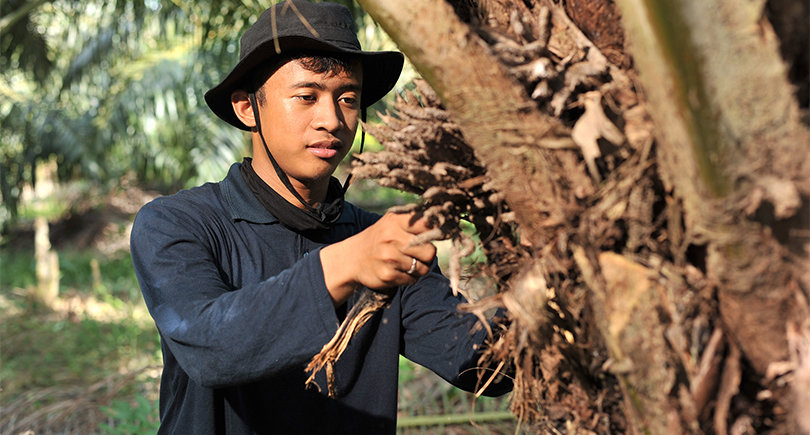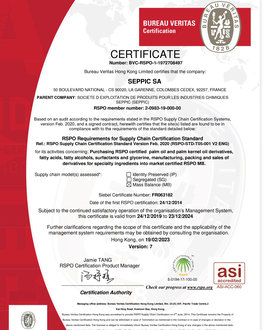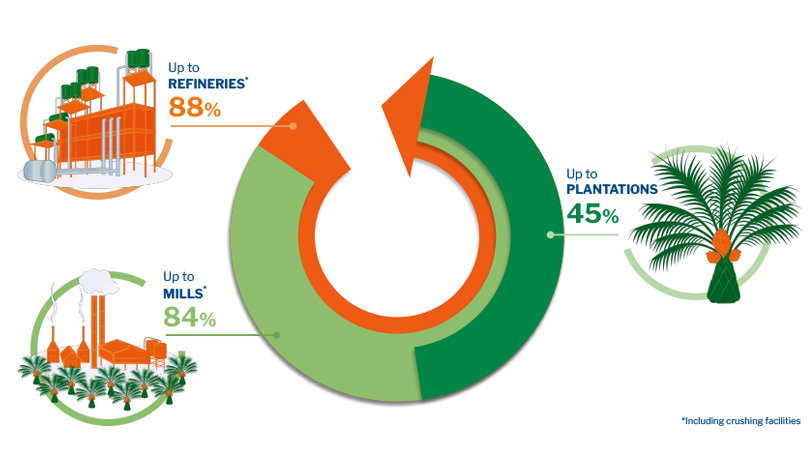Seppic committed to sustainable palm oil

Seppic takes action for responsible palm sourcing
The palm supply chain is a key supply chain in biobased ingredient manufacturing. The very high per-hectare productivity of oil palms has favored the expansion of this crop whose primary uses are for food. The quest for biobased fatty chains for ingredient manufacturing has led to the extension of uses to other sectors such as cosmetics and detergents. However, this expansion should not be at the expense of ecological and social considerations, which is why Seppic actively promotes the sustainable transformation of the palm supply chain.
Seppic takes a long-term commitment to the sustainable transformation of the palm supply chain
Seppic's commitment to sustainable sourcing is part of a progress approach focusing on 3 pillars:
- caring for people
- caring for the environment
- caring for our stakeholders
The palm supply chain embraces several links between Seppic and the plantations. This is why, in order to act and encourage sustainability within the palm oil industry, Seppic is building its approach by relying on RSPO (Roundtable for Sustainable Palm Oil) and by participating in the ASD collective (Action for Sustainable Derivatives). Seppic's goal is to play a proactive role in tackling deforestation and to ensure human rights are respected in the palm oil industry by drawing on NDPE principles and methodologies
Caring for people
In its actions, Seppic is committed to respecting Human Rights based on the principles of the United Nations as well as to respecting the international rules of the International Labor Organization (ILO) as regards labor legislation.
More specifically, as regards the palm supply chain,
- Seppic is committed to smallholders. Smallholders are farmers who grow oil palm on areas generally smaller than 50 ha, in addition to subsistence crops for their families. Smallholders weigh globally 40% in the palm sector. By purchasing ISCPO and ISCPKO* certificates from RSPO, Seppic supports the actions of RSPO (Roundtable for Sustainable Palm Oil) for smallholders. (find out more: see the RSPO impact brochure)
* respectively Independent Smallholder Palm Oil and Palm Kernel Oil certificates - Seppic plays an active role in the ASD initiative "Grievances" subgroup, which monitors and takes action against Human Rights and environmental violations in the palm-based derivatives supply chain. In line with this, Seppic has initiated an in-house procedure to deal with these grievances, where our suppliers become actively involved in the sustainable transformation of the palm supply chain.
Caring for the environment
Seppic is committed to non-deforestation, non-dewatering of peatlands and respect for biodiversity.
Seppic actively develops its mass balance certification program (RSPO), which contributes to the production of certified sustainable palm oil and publishes its progress towards 100% MB-certified sourcing of palm and palm-based derivatives every year.
This commitment is fully integrated into an eco-design methodology applied to all our innovation projects and aimed for minimizing impacts on the environment.
Every year, with ASD's support, Seppic measures the results of its NDPE commitment via a transparency survey up to the mills, and a risk analysis. At the same time, hand-in-hand with ASD participants, Seppic is involved in the "Positive Impact" working group whose ambition is to collectively support a field project related to our supply chains. The ASD collective publishes its progress report: link to the ASD report
Caring for our stakeholders
As part of its sustainable palm program, Seppic responds to all its customers, whether ASD participants or not, on their traceability investigations by sharing the list of mills in its supply chain with them.
Seppic ensures its direct suppliers take a proactive stance by accompanying it every year in investigating the supply chain up to the mills as well as in investigating how grievances are managed.
Seppic has its commitments and progress towards sustainability in the palm sector rated by an independent and verified body. This rating, the SPI (Sustainable Palm Index), is addressed to our customers and Seppic assesses its palm-based derivative suppliers using the same methodology.
Our progress in figures
All Seppic production sites using palm-based derivatives are MB-certified. Discover our certificates here below as well as on RSPO.org


In 2021, the transparency investigation (based on the 2020 palm-based derivatives supply) resulted in 84% traceability including mills (List available on request). The list of mills from our 2020 supply investigation will soon be published on the RSPO site

In 2020, 78% of our sourcing was MB-certified (Mass Balance based on the RSPO 2020 standard) and 15% of our sourcing was covered by smallholder B&C certificates (ISCPO and ISCPKO, see RSPO PalmTrace platform). Our 2021 ambition is to reach 100% certified sourcing with 90% MB sourcing and we aim for 100% MB sourcing by 2025.




